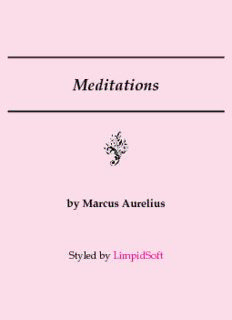Table Of ContentMeditations
byMarcusAurelius
StyledbyLimpidSoft
Contents
INTRODUCTION 4
MARCUSAURELIUSANTONINUS:
THEROMANEMPEROR 34
THEFIRSTBOOK 36
THESECONDBOOK 57
THETHIRDBOOK 69
2
CONTENTS
THEFOURTHBOOK 87
THEFIFTHBOOK 117
THESIXTHBOOK 147
THESEVENTHBOOK 178
THEEIGHTHBOOK 211
THENINTHBOOK 243
THETENTHBOOK 272
THEELEVENTHBOOK 305
THETWELFTHBOOK 330
NOTES 389
BOOK II . . . . . . . . . . . . . . . . . . 391
BOOK IV . . . . . . . . . . . . . . . . . . 393
BOOK V . . . . . . . . . . . . . . . . . . 394
BOOK VI . . . . . . . . . . . . . . . . . . 395
3
CONTENTS
BOOK VII . . . . . . . . . . . . . . . . . 396
BOOK X . . . . . . . . . . . . . . . . . . 398
BOOK XI . . . . . . . . . . . . . . . . . . 399
GLOSSARY 400
4
The present document was derived
from text provided by Project Guten-
berg(document2680)whichwasmade
availablefreeofcharge. Thisdocument
isalsofreeofcharge.
INTRODUCTION
". . . they’llremarry
Ere the worm pierce your winding-
sheet,erethespider
Makeathincurtainforyourepitaphs."
MARCUS AURELIUS ANTONINUS was born
on April 26, A.D. 121. His real name was M. An-
nius Verus, and he was sprung of a noble fam-
ily which claimed descent from Numa, second
King of Rome. Thus the most religious of em-
perors came of the blood of the most pious of
early kings. His father, Annius Verus, had held
6
high office in Rome, and his grandfather, of the
samename,hadbeenthriceConsul. Bothhispar-
ents died young, but Marcus held them in lov-
ing remembrance. On his father’s death Mar-
cuswasadoptedbyhisgrandfather,theconsular
Annius Verus, and there was deep love between
these two. On the very first page of his book
Marcus gratefully declares how of his grandfa-
ther he had learned to be gentle and meek, and
to refrain from all anger and passion. The Em-
peror Hadrian divined the fine character of the
lad, whom he used to call not Verus but Veris-
simus,moreTruthfulthanhisownname. Head-
vancedMarcustoequestrianrankwhensixyears
of age, and at the age of eight made him a mem-
ber of the ancient Salian priesthood. The boy’s
aunt,AnniaGaleriaFaustina,wasmarriedtoAn-
toninusPius, afterwardsemperor. Henceitcame
about that Antoninus, having no son, adopted
Marcus, changing his name to that which he is
known by, and betrothed him to his daughter
Faustina. His education was conducted with all
7
care. The ablest teachers were engaged for him,
and he was trained in the strict doctrine of the
Stoicphilosophy,whichwashisgreatdelight. He
was taught to dress plainly and to live simply,
to avoid all softness and luxury. His body was
trained to hardihood by wrestling, hunting, and
outdoor games; and though his constitution was
weak, he showed great personal courage to en-
counter the fiercest boars. At the same time he
waskeptfromtheextravaganciesofhisday. The
greatexcitementinRomewasthestrifeoftheFac-
tions, as they were called, in the circus. The rac-
ingdriversusedtoadoptoneoffourcolours–red,
blue,white,orgreen–andtheirpartisansshowed
an eagerness in supporting them which nothing
could surpass. Riot and corruption went in the
train of the racing chariots; and from all these
thingsMarcusheldseverelyaloof.
In140Marcuswasraisedtotheconsulship,and
in 145 his betrothal was consummated by mar-
riage. Two years later Faustina brought him a
daughter; and soon after the tribunate and other
8
imperialhonourswereconferreduponhim.
Antoninus Pius died in 161, and Marcus as-
sumed the imperial state. He at once associated
withhimselfL.CeioniusCommodus, whomAn-
toninushadadoptedasayoungersonatthesame
time with Marcus, giving him the name of Lu-
cius Aurelius Verus. Henceforth the two are col-
leaguesintheempire, thejuniorbeingtrainedas
it were to succeed. No sooner was Marcus set-
tled upon the throne than wars broke out on all
sides. Intheeast,VologesesIII.ofParthiabegana
long-meditated revolt by destroying a whole Ro-
man Legion and invading Syria (162). Verus was
sent off in hot haste to quell this rising; and he
fulfilled his trust by plunging into drunkenness
anddebauchery,whilethewarwaslefttohisoffi-
cers. SoonafterMarcushadtofaceamoreserious
dangerathomeinthecoalitionofseveralpower-
ful tribes on the northern frontier. Chief among
those were the Marcomanni or Marchmen, the
Quadi (mentioned in this book), the Sarmatians,
the Catti, the Jazyges. In Rome itself there was
9
pestilence and starvation, the one brought from
the east by Verus’s legions, the other caused by
floods which had destroyed vast quantities of
grain. After all had been done possible to al-
layfamineandtosupplypressingneeds–Marcus
being forced even to sell the imperial jewels to
find money–both emperors set forth to a strug-
gle which was to continue more or less during
the rest of Marcus’s reign. During these wars, in
169, Verus died. We have no means of following
thecampaignsindetail;butthusmuchiscertain,
that in the end the Romans succeeded in crush-
ing the barbarian tribes, and effecting a settle-
ment which made the empire more secure. Mar-
cuswashimselfcommander-in-chief,andvictory
was due no less to his own ability than to his
wisdom in choice of lieutenants, shown conspic-
uouslyinthecaseofPertinax. Therewereseveral
importantbattlesfoughtinthesecampaigns;and
one of them has become celebrated for the leg-
endoftheThunderingLegion. Inabattleagainst
the Quadi in 174, the day seemed to be going in
10
Description:emperor as soon as Marcus, reign Justin at Rome became a martyr to his faith, MARCUS AURELIUS ANTONINUS:

